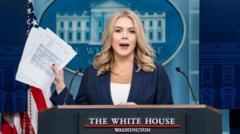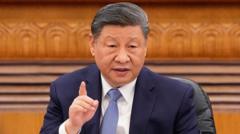In a bold move that could redefine federal regulatory practices, President Trump has instructed ten federal agencies, including the EPA and the Energy Department, to adopt a new procedure to abolish various energy and environmental rules. This directive was issued during a signing ceremony on Wednesday and is designed to introduce "sunset" provisions that will automatically terminate regulations by October 2026, unless renewed, which could only be done in five-year increments.
Trump's Controversial Executive Orders to Repeal Regulations

Trump's Controversial Executive Orders to Repeal Regulations
President Trump's latest executive directives aim to expedite the repeal of energy and environmental regulations, raising significant legal concerns.
Legal analysts are expressing alarm over the legitimacy of these actions. One executive order notably seeks to relax federal restrictions on water flow in shower heads, justified by Trump’s assertion: “Because I say so.” This rationale defies the established Administrative Procedure Act of 1946 that mandates agencies to undergo a substantial “notice and comment” process prior to making any significant regulatory changes.
Experts suggest that these orders could meet substantial opposition in the courts. Jody Freeman, director at Harvard Law School's Environmental and Energy Law Program, emphasized the potential legal issues saying, “On its face, all of this is totally illegal.” This sentiment underscores concerns within the legal community that the administration may be pushing boundaries without adhering to established protocols and processes.
President Trump's initiatives are inherently contentious, raising questions regarding authority, legal compliance, and long-term impacts on environmental safeguards. As these actions unfold, their acceptance or rejection will likely hinge on judicial interpretation of executive power versus regulatory requirements, impacting not just Trump's agenda but the future of regulatory governance in the U.S.
Experts suggest that these orders could meet substantial opposition in the courts. Jody Freeman, director at Harvard Law School's Environmental and Energy Law Program, emphasized the potential legal issues saying, “On its face, all of this is totally illegal.” This sentiment underscores concerns within the legal community that the administration may be pushing boundaries without adhering to established protocols and processes.
President Trump's initiatives are inherently contentious, raising questions regarding authority, legal compliance, and long-term impacts on environmental safeguards. As these actions unfold, their acceptance or rejection will likely hinge on judicial interpretation of executive power versus regulatory requirements, impacting not just Trump's agenda but the future of regulatory governance in the U.S.




















